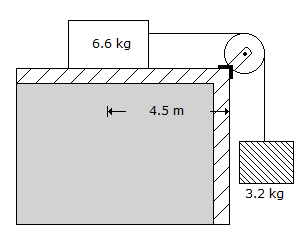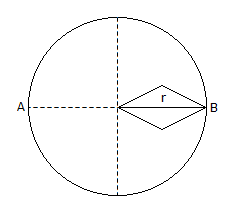Civil Engineering :: Applied Mechanics
-
If two bodies of masses M1 and M2(M1 > M2) are connected by alight inextensible string passing over a smooth pulley, the tension in the string, will be given by
-
For a simple pendulum, the period of one oscillation is
-
A load of 500 kg was lifted through a distance of 13 cm. by an effort of 25 kg which moved through a distance of 650 cm. The velocity ratio of the lifting machine is
-
The angle of friction is :
-
The resultant of two forces acting at right angles is 5 kgf and if they act at an angle of 60°, it is 37 kgf. The magnitudes of the forces are:
-
A body A of mass 6.6 kg which is lying on a horizontal platform 4.5 m from its edge is connected to the end of a light string whose other end is supporting a body of mass 3.2 kg as shown in below figure. If the friction between the platform and the body A is 1/3, the acceleration is

-
The motion of a particle is described by the relation x = t2- 10t + 30, where x is in metres and t in seconds. The total distance travelled by the particle from t = 0 to t = 10 seconds would be
-
Three forces which act on a rigid body to keep it in equilibrium. The forces must be coplanar and
-
A square hole is made in a circular lamina, the diagonal of the square is equal to the radius of the circleas shown in below figure the shift in the centre of gravity is

-
For perfectly elastic bodies, the value of coefficient of restitution is


 Whatsapp
Whatsapp
 Facebook
Facebook

